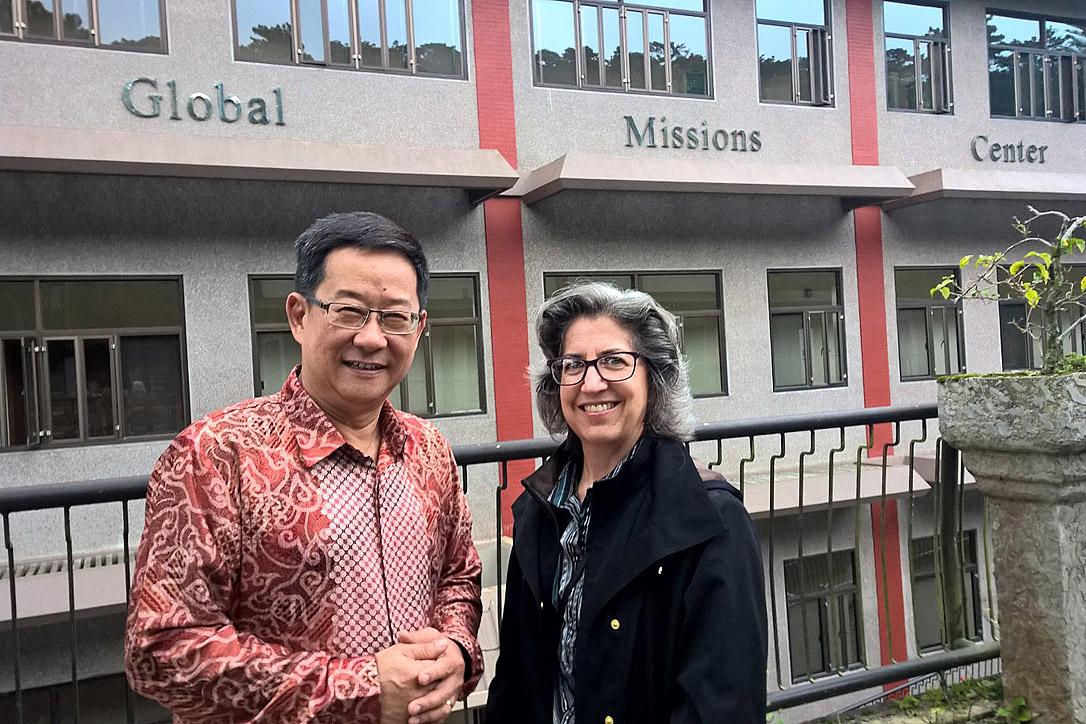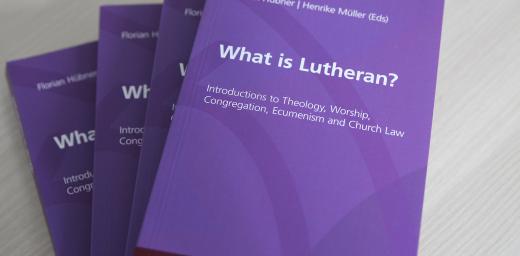Lutheran-Pentecostal dialogue aims to create better understanding and witness

Rev. Tham Wan Yee, of the Assemblies of God in Malaysia, and Rev. Dr Cheryl Peterson, of the Evangelical Lutheran Church in America. Lutherans and Pentecostals have begun a five-year dialogue to seek better understanding. Photo: LWF/Rev. Dr Kaisamari Hintikka
First conversations on theological and spiritual traditions take place
Lutherans and Pentecostals have begun a five-year dialogue to seek better understanding and common witness locally and internationally, with initial conversations taking place at Asia Pacific Theological Seminary at Baguio, Philippines, 15-20 September.
The dialogue has been a long-standing commitment of The Lutheran World Federation (LWF) and it is hoped the exchange will help the two groups appreciate each other’s theological and spiritual traditions, a communique from the International Lutheran-Pentecostal Dialogue stated.
The theme of the dialogue, which includes representatives of various classical Pentecostal churches and LWF member churches, is Christian identity in light of Luke 4:18-19, with the focus of the first session being, “Sent by the Spirit – Identity in Christ”.
Papers were presented by Rev. Dr William J. Samuel of the Evangelical Lutheran Church of Malaysia and Dr Jean-Daniel Plüss of the Swiss Pentecostal Mission, co-chair of the dialogue. The Lutheran co-chair is Rev. Dr Walter Altman of the Evangelical Church of the Lutheran Confession in Brazil.
Dialogue members discussed the papers in plenary sessions and small groups in an effort to better understand both commonalities and differences. They took turns leading joint devotions, and worshipped together at the Baguio Assembly City Church and St. Stephen Lutheran Church.
The group visited the Lutheran Theological Seminary in Baguio, The dialogue members, also met the faculty and local Lutheran and Pentecostal leaders to talk about their respective churches and ministries.
Dialogue helps us understand each other
Speaking to the LWI, Rev. Dr Cheryl Peterson of the Evangelical Lutheran Church in America said both sides have stereotypes of the other that need to be addressed but that their mutual focus on Christ gives them a strong basis on which to discuss the way in which they proclaim the good news.
“We not only discussed our theological differences but we also prayed together, asking God to help us grow closer in our witness to Christ and service to a needy world,” said Peterson, associate professor of systematic theology at Trinity Lutheran Seminary in Columbus, Ohio.
Peterson, who has taken part in dialogues with Roman Catholics, noted that Pentecostalism is a much younger movement - about 100 hundred years old - but is the fastest growing segment of Christianity, particularly in the global South.
“Dialogue can help us better understand this fast-growing expression of Christianity, especially important in light of our historic suspicion of more experience-based forms of Christianity,” she added.
When Lutherans have engaged with charismatic Christians or Pentecostals in the past, Peterson said it has largely been in order to critique it for focusing on unmediated experiences of the Spirit, and on healing, victory over sin and versions of the prosperity gospel.
“I have argued in my work that we Lutherans not only have something to share with Pentecostals, we have something to learn from this revival and renewal movement for the sake of God’s mission in the world, but before we can share with or learn from this tradition, we need to better understand them,” she emphasized.
Expressions of unity are vital
For his part, Rev. Tham Wan Yee of the Assemblies of God in Malaysia, found the dialogue cordial, aided by the personal stories about what it means to be Lutheran or Pentecostal in today’s world.
Yee, who is president of the Asia Pacific Theological Seminary where the dialogue was held, indicated that he felt both traditions have histories as movement that never really wanted to destroy the unity of the church.
“The challenge is that we are at different points of history in the development of our movements,” Yee added.
Looking ahead to the next round of conversations in a year’s time, Yee said, “There is a lot more understanding and the first round has helped bring us closer together as friends and created trust among us personally.”
Such talks between Lutherans and the Pentecostal movement are critical today, he added. “In a globalized world, expressions of unity in the body of Christ become even more vital for Christian witness to the world. And, we have a lot in our traditions that can enrich each other.”
His urgency was echoed by LWF assistant general secretary for ecumenical relations, Rev. Dr Kaisamari Hintikka, who concluded, “It is good to know that this dialogue, which is of great importance for many of our member churches, is finally a reality.”
Next meeting in Wittenberg
The next meeting of the dialogue will take place in September 2017 in Wittenberg, Germany, where the theme will be “… he has anointed me to proclaim…” (Luke 4: 18). In 2018 discussions in Latin America will focus on the theme “… good news to the poor…” In 2019 the dialogue moves to Africa and the theme will be “freedom, recovery and release…”
The communique stated that in 2020 the dialogue will release a common document based upon the work it has completed on Christian identity.
One aspect of LWF mission is to witness with other Christians. Its ecumenical work is mainly conducted through dialogues, including one trilateral dialogue (Mennonites and Roman Catholics) and three other on-going bilateral dialogues (Anglicans, Orthodox, and Catholics).
Publications





